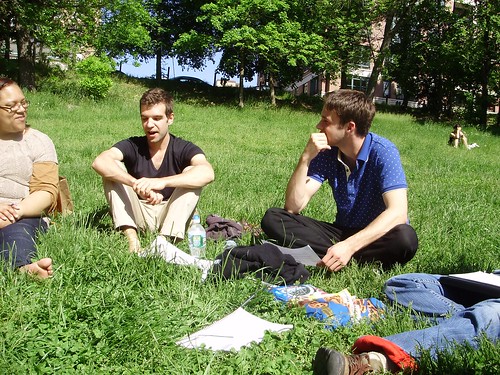Class Report
Word Games to Work Out Your Verbal Imagination

Teachers: Axel Tifft (left) and Forrest Miller (right)
Facilitator: Sonia Booth
On a very sunny afternoon in a beautiful field at Rock Creek Park, teachers Forrest and Axel shared some word games with students, and they bent our minds! The games don’t require pencil or paper, just your attention. Axel explained that this kind of game is very convenient when you take long bus trips in China, which he had done.
All three of the games required a lot of creativity from the students, but “Psychologist” in particular took a real group effort. For this game, our rule was that people wearing sunglasses or glasses had to say the word “like” at least once when they answered the psychologist’s (Forrest’s) questions, and people not wearing glasses had to not say the word “like” at all. It got tricky to follow the rule when students took their glasses on and off and borrowed other students’ glasses. Miraculously, the psychologist figured it out.
Please see the game instructions below. Thanks to Forrest and Axel for sharing!
Psychologist
Number of players: 3 to 8
- The person acting as the psychologist leaves the group. Everyone else in the group thinks of a rule to follow once the psychologist returns.
- The group lets the psychologist know they are ready. The psychologist returns to the group and asks questions to try and determine the rule the members of the group are following. It’s most fun/effective for the psychologist to ask questions unrelated to the rule but that test different hypotheses about what the rule might be.
- If a player breaks the rule mid-play, he must say “psychologist!” to indicate to the psychologist that the last statement/action did not follow the rule.
- The round ends when the psychologist guesses the rule or states a rule so similar to the rule that you give it to him.
- Chose a new psychologist and repeat.
Note: Try to be subtle in your demonstration of the rule at the beginning. If the psychologist is having difficulty, slowly become more indiscreet.
Example rules:
- Always having one part of your body crossed (eyes, fingers, legs).
- Use a number in every sentence. Words like hate (8), to (2), and before (4) count.
- Always be passive aggressive to the psychologist when speaking to him.
Sonia Booth is a museum educator who grew up in the Boston area. She works as a program coordinator at the U.S. Holocaust Memorial Museum. Before she moved to DC she gave tours of the Boston Massacre site for the Old State House Museum in Massachusetts. As part of the Knowledge Commons DC organizing team, she helps wrangle volunteers, facilitators, and classes. Her favorite fruit is cherimoya.
